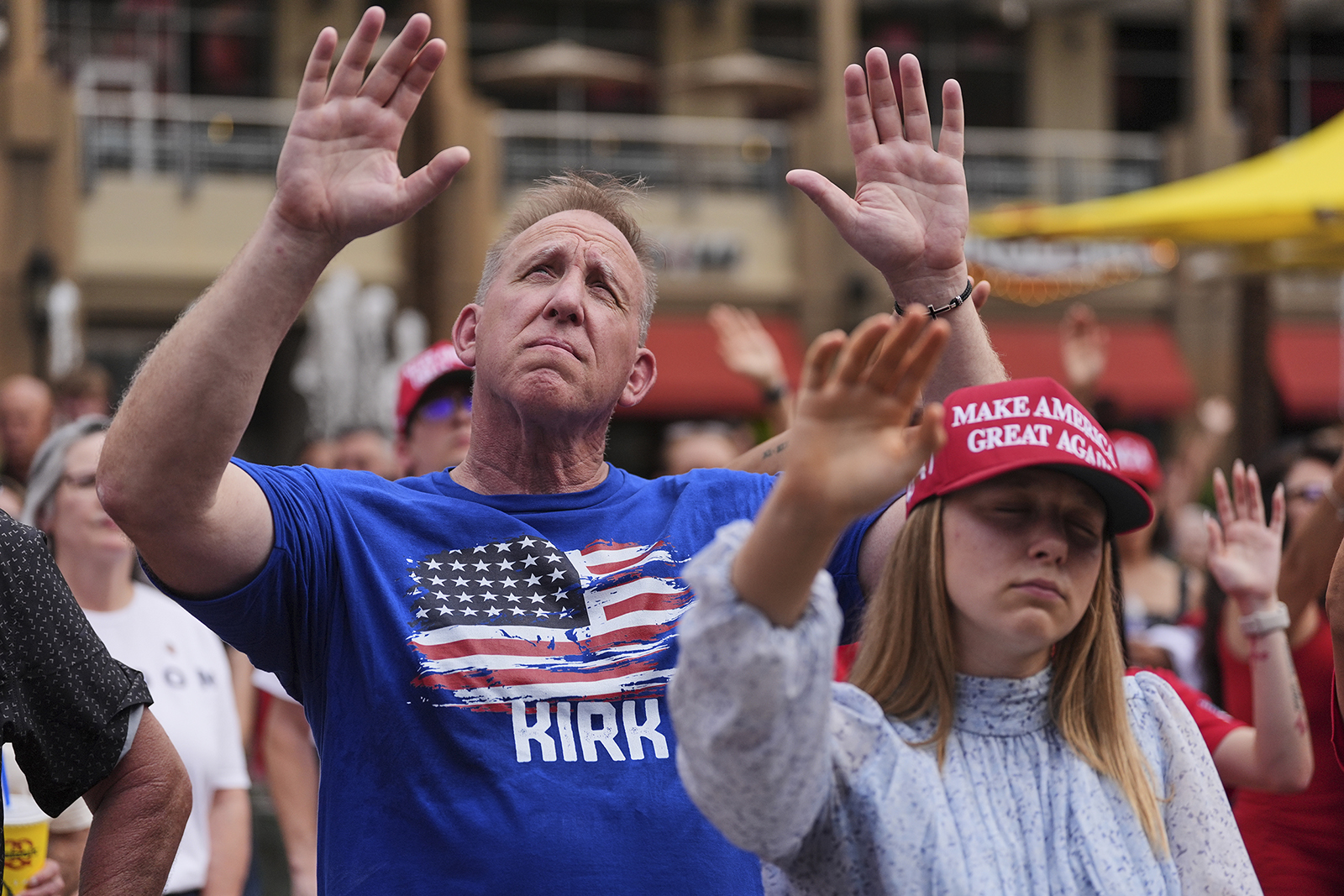
(RNS) — In the weeks since Charlie Kirk’s assassination, American Christians have chosen strange epitaphs to memorialize the popular conservative pundit.
“If Charlie Kirk lived in the biblical times, he would have been the 13th disciple,” said U.S. Rep. Troy Nehls in a recent hearing on Capitol Hill. Pastor Mark Driscoll dubbed Kirk “an evangelist” in remarks to his congregation. “This guy is a modern day St. Paul,” Cardinal Timothy Dolan told Fox News.
That any Christians agree with these attempts to sanitize Kirk exposes a perilous consensus among many Christians that the faith should be the bedrock of authoritarianism in the United States. This means the fight against American authoritarianism requires an organized effort to shift this Christian consensus.
What we accept as normal or even correct doesn’t arrive as a law of nature. In our larger society, this idea of normal is crafted, story by story, custom by custom, song by song, headline by headline, ad by ad. For Christians it is tradition, the church, liturgy, clergy, and Scripture that shape a common idea of what it means to be true to the faith. Its symbols, stories and rituals shape what and whom we venerate, what we do and refuse to do in our daily lives and what political agendas we support.
If Kirk was an evangelist, his call apparently wasn’t to amplify the traditions, stories and rituals that followed from what Jesus preached. Jesus preached that one of the two greatest commandments from God is to love one’s neighbor. He demonstrated this himself by waging scandalous spectacles of welcome, accepting known “sinners” and outcasts into the kingdom of God and combating the pervasive culture of purity depicted in the Gospels. See, for instance, the famous story in which Jesus pardons a woman “caught” committing adultery.
Compare this to Kirk’s show of antagonizing transgender people, making liberal use of the slur “tranny.” He broadcast anti-Blackness, wielding statistics to propagandize us as “prowling Blacks” targeting our white neighbors for sport. He stoked Islamophobia, warning conservatives that “Marxism” and “woke-ism” were “combining with Islamism to go after what we call the American way of life.”
He sanctified gun culture, saying, “some gun deaths every single year so that we can have the Second Amendment to protect our other God-given rights. That is a prudent deal. It is rational.” His words show that Kirk was certainly a missionary for conservative values, but that’s not the same thing as a proponent of Jesus’ gospel.
That so many Christians aren’t scandalized by Kirk’s ascent to apostolic status speaks volumes about the Christian culture at work behind their silence or vocal approval. The version of the religion that his Turning Point USA organization now vows to carry forward has normalized bigotry not only as acceptable, but aspirational.
That should concern more than Christians. Kirk’s cruel campaigning for conservatism is a formidable political force. His view of Christianity shapes what they do at the ballot box, how they behave in their communities. Until this consensus shifts, authoritarian elements will continue to benefit from it.
The good news is that such shifts are possible. Once upon a time in the United States, it was common to hold African people as lifelong slaves. Jim Crow apartheid was normal. These attitudes were changed by organized civil resistance movements. The same must happen to combat the Christian consensus that supports authoritarianism.
The Civil Rights Movement didn’t just shut down cities with peaceful marches and win Supreme Court cases. It directly confronted the theological supports for systemic racism. Integrated civil rights groups infiltrated all-white churches and performed kneel-ins when told to leave. Signs reading “Segregation is a Sin” were spotted among the crowds of children who marched in Birmingham as part of the 1963 Project C desegregation campaign. The Rev. Martin Luther King Jr.’s famous Letter from a Birmingham Jail was addressed to a group of white Alabama pastors who opposed his activism.
Civil rights activists of the time understood that America’s idea of itself was just as much their terrain as the seats at a cafeteria counter or the steps of a government building. Today’s non-MAGA churches have the same approach, intentionally seeking to change the Christian imagination so that it’s less like to yield praise for champions of oppression.
Christians can be practical about the quest to shift common understanding of what Christians’ purpose is in the public debate. Any movement has an easier time winning victories when it has “passive popular support” from the public, meaning about 50% of the population agrees with the movement.
This doesn’t mean we put the Christian message to a vote. The effort to shift the Christian consensus needs to be nonpartisan, not a movement to simply create more Christian leftists and progressives. It needs to be a diverse coalition of Christians, an alliance between leftists and liberals, calling their compatriots to something higher than partisan activism, but to faithful Christian witness through public spectacle, storytelling, liturgies and public displays of repentance.
Charlie Kirk is indisputably a martyr, just not for what Jesus’ disciples called the gospel. That should be something all Christians can see, and believe.
